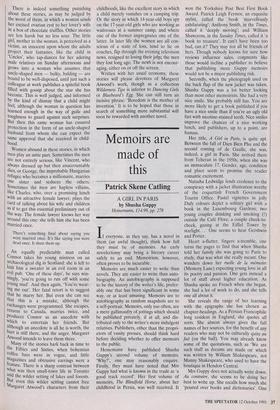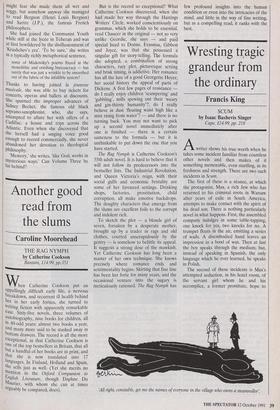Memoirs are made of this
Patrick Skene Catling
A GIRL IN PARIS by Shusha Guppy Heinemann, £14.99, pp. 278 If everyone, as they say, has a novel in them (an awful thought), think how full they must be of memoirs. An early riovelectomy may bring a literary career safely to an end. Memoirism, however, often proves to be incurable.
Memoirs are much easier to write than novels. They are easier to write than auto- biography. An autobiography is supposed to be the history of the writer's life, prefer- ably one that has been significant in some way, or at least amusing. Memoirs are to autobiography as random snapshots are to a self-portrait. Memoirs, only too often, are a mere gallimaufry of jottings which should be published privately, if at all, and dis- tributed only to the writer's more indulgent relatives. Publishers, other than the propri- etors of vanity presses, should think hard before deciding whether to offer memoirs to the public.
Heinemann have published Shusha Guppy's second volume of memoirs. `Why?', one may reasonably enquire. Firstly, they must have noted that Mrs Guppy had what is known in the trade as 'a good track record'. Her first volume of memoirs, The Blindfold Horse, about her childhood in Persia, was well received. It won the Yorkshire Post Best First Book Award. Patrick Leigh Fermor, an exquisite stylist, called the book 'marvellously exhilarating'; Anthony Smith, in the Times, called it 'deeply moving'; and William Shawcross, in the Sunday Times, called it 'a book to treasure'. It can't have been too bad, can it? They may not all be friends of hers. Though nobody knows for sure how reviews influence sales, comments like those would incline a publisher to believe that publishing more Guppy memoirs would not be a major publishing risk.
Secondly, when the photograph used on the back flap of the new jacket was taken, Shusha Guppy was a lot better looking than most other memoirists. She had a very nice smile. She probably still has. You are more likely to get a book published if you have a nice smile than if you're an ugly old fart with nicotine-stained teeth. Nice smiles improve the chances of a nice working lunch, and publishers, up to a point, are human.
Her title, A Girl in Paris, is quite apt. Between the fall of Dien Bien Phu and the second coming of de Gaulle, she was, indeed, a girl in Paris. She arrived there from Teheran in the 1950s, when she was an immaculate 17. Gender, age, condition and place seem to promise the reader romantic excitement.
Natasha Ledwidge lends credence to the conspiracy with a jacket illustration worthy of the coquettish French Government Tourist Office. Pastel vignettes in jolly Dufy colours depict a solitary girl with a book in the Luxembourg Gardens; two young couples drinking and smoking (!) outside the Café Flore; a couple cheek-to- cheek, gazing at the Eiffel Tower by starlight. .. One seems to hear Gershwin and Porter.
Heart a-flutter, fingers a-tremble, one turns the pages to find that when Shusha told her family she was going to Paris to study, that was what she really meant. One wanders down her ruelle de la rnemoire (Memory. Lane) expecting young love in all its poetry and passion. One gets instead a lot of stuff about higher education. As Shusha spoke no French when she began, she had a lot of work to do, and she tells one all about it.
She reveals the range of her learning with the epigraphs she has chosen as chapter-headings. As a Persian Francophile long resident in England, she quotes all sorts. She almost always gives the full names of her sources, for the benefit of any readers who may not be culturally quite au fait (on the ball). You may already know some of the quotations, such as 'We are such stuff as dreams are made on' which was written by William Shakespeare, not Manny Shakespeare, who used to have the boutique in Hendon Central.
Mrs Guppy does not actually write down. Au contraire, she seems to be doing her best to write up. She recalls how much she `poured over books and dictionaries'. One
might fear she made them all wet and soggy, but somehow anyway she managed to read Bergson (Henri Louis Bergson) and Sartre (J.P.), the famous French philosophers.
She had joined the Communist Youth while still at the lycee in Teheran and was at first bewildered by the disillusionment of `Krushchev's era'. 'To be sure,' she writes in a typically richly metaphorical sentence,
some of Miakovsky's poems flayed at the monolithic and crushing bureaucracy — but surely that was just a wrinkle to be smoothed out of the fabric of the infallible system?
Thanks to having joined la jeunesse musicale, she was able to buy tickets for Concerts, operas and ballets at discounts. She spurned the improper advances of Sidney Bechet, the famous old black soprano-saxophonist, who, she says, attempted to allure her with offers of a Cadillac, a house and trips across the Atlantic. Even when she discovered that she herself had a singing voice good enough to record commercially, she never abandoned her devotion to theological philosophy.
`Memory,' she writes, 'like God, works in mysterious ways.' Can Volume Three be far behind?



























































 Previous page
Previous page